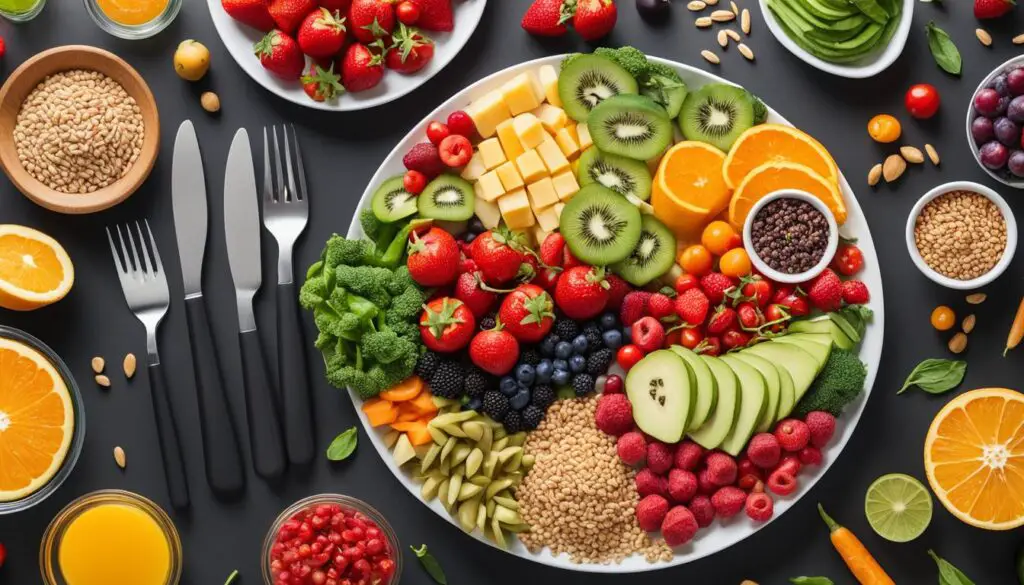As I continue on my journey towards a healthier lifestyle, I have come to appreciate the importance of meal planning in maintaining weight loss. Meal planning involves organizing and preparing meals in advance, ensuring that I consume a balanced diet that supports my weight loss goals. It not only helps me stay on track but also establishes sustainable habits that promote long-term success.
Healthy eating is a crucial aspect of weight loss maintenance, and meal planning plays a significant role in achieving this. By carefully selecting nutritious ingredients and portion sizes, I am able to nourish my body with the right nutrients while keeping my calorie intake in check. With meal planning, I can enjoy a varied and balanced diet while avoiding impulsive, unhealthy food choices.
Meal planning also provides the opportunity to create a sense of structure and routine around my eating habits. By taking the time to plan and prepare meals ahead of time, I am less likely to rely on convenience foods or unhealthy options when hunger strikes. Instead, I have healthy options readily available, empowering me to make mindful choices that align with my weight loss goals.
Additionally, meal planning allows me to track my progress and make any necessary adjustments along the way. By monitoring what I eat and how it makes me feel, I can identify patterns and areas for improvement. This self-awareness helps me stay motivated and accountable, ensuring that I continue to make choices that support my weight loss journey.
Overall, meal planning is a powerful tool in maintaining weight loss and living a healthy lifestyle. It provides structure, promotes healthy eating habits, and empowers me to make informed choices. By incorporating meal planning into my daily life, I can continuously support my weight management goals and enjoy the long-term benefits of a balanced and sustainable approach to eating.
Key Takeaways:
- Meal planning is essential for maintaining weight loss and a healthy lifestyle.
- It helps in consuming a balanced diet and avoiding impulsive, unhealthy food choices.
- Meal planning provides structure and routine, making it easier to stick to healthy eating habits.
- Tracking progress and making adjustments through meal planning promotes accountability and motivation.
- Incorporating meal planning into daily life supports long-term weight management goals.
The Benefits of Meal Planning for Weight Loss Maintenance
Meal planning for weight loss maintenance offers several benefits. It helps individuals manage their weight by promoting portion control and making it easier to adhere to a calorie-controlled diet. By pre-planning meals and snacks, individuals can ensure they are consuming nutrient-dense foods that support their overall health and weight management goals. Additionally, meal planning encourages the development of healthy habits and reduces the likelihood of impulsive, unhealthy food choices.
Weight management is a key aspect of a healthy lifestyle. When it comes to maintaining weight loss, meal planning plays a crucial role. By strategically planning and preparing meals in advance, individuals can have better control over their portion sizes and calorie intake. This not only helps prevent overeating but also ensures that they are consuming the right amount of nutrients to support their weight management goals.
Portion control is essential for weight management as it allows individuals to consume the appropriate amount of food for their body’s needs. By pre-planning meals and snacks, individuals can accurately portion out their food and avoid mindless eating. This practice promotes a healthy relationship with food and prevents unnecessary weight gain.
Another advantage of meal planning for weight loss maintenance is the focus on consuming nutrient-dense foods. Nutrient-dense foods are rich in essential vitamins, minerals, and other beneficial compounds, making them ideal choices for overall health and weight management. By planning meals in advance, individuals can include a variety of nutrient-dense foods, such as fruits, vegetables, lean proteins, whole grains, and healthy fats, ensuring they are getting the right balance of nutrients.
Meal planning also promotes the development of healthy habits. When individuals commit to meal planning, they are more likely to make thoughtful choices and avoid impulsive, unhealthy food options. It encourages them to prioritize their health and well-being by making conscious decisions about what to eat and how much to consume. This practice instills discipline and fosters long-term healthy habits.
“Meal planning offers a sense of control and empowerment when it comes to weight management. It allows individuals to take charge of their food choices and sets them up for success in achieving their weight loss goals.” – Anonymous
By incorporating meal planning into their routine, individuals can also reduce the likelihood of relying on calorie counting alone. Instead of constantly tracking calories, meal planning encourages a more balanced approach to weight management. By focusing on consuming the right types and portions of foods, individuals can develop a sustainable, healthy eating pattern that supports long-term weight loss maintenance.
To visualize the benefits of meal planning for weight loss maintenance, here’s a simple table comparing the advantages of meal planning versus not meal planning:
| Advantages of Meal Planning | Disadvantages of Not Meal Planning |
|---|---|
| Promotes portion control | Increased risk of overeating |
| Ensures nutrient-dense food choices | Higher probability of consuming empty calories |
| Develops healthy habits | Greater likelihood of impulsive, unhealthy food choices |
By considering the benefits outlined above, it is clear that meal planning plays a vital role in weight loss maintenance. Not only does it support portion control and nutrient-dense food choices, but it also encourages the development of healthy habits that are essential for long-term success.
Strategies for Effective Meal Planning
When it comes to maintaining weight loss, effective meal planning is essential. By implementing smart strategies, you can set yourself up for success and ensure that your meals align with your goals. Here are some key strategies to consider:
Create a Well-Planned Grocery Shopping List
Start your meal planning journey by creating a grocery shopping list that includes nutritious, whole foods. Focus on buying fresh fruits and vegetables, lean proteins, whole grains, and healthy fats. By prioritizing these items and minimizing the purchase of processed and high-calorie foods, you can build a foundation for healthier meals.
Meal Prepping for Efficiency
Meal prepping involves preparing meals and snacks in advance, saving you time and ensuring that you have healthy options readily available. Dedicate a specific time each week to plan and prepare your meals. This could include washing and chopping vegetables, cooking grains, or marinating proteins. By having pre-prepared ingredients on hand, you’ll be more likely to make balanced meal choices throughout the week.
Smart Recipe Selection and Portion Sizing
When selecting recipes for your meal plan, make sure they align with your dietary goals. Look for recipes that provide a balance of macronutrients and include a variety of flavors and textures to keep your meals enjoyable. Additionally, pay attention to portion sizes to ensure you’re consuming appropriate amounts of each food group.
Track Your Progress and Make Adjustments
To stay on track with your weight loss maintenance goals, it’s important to track your progress and make adjustments as necessary. Keep a food journal or use a meal tracking app to record what you eat and monitor your portion sizes. This will allow you to identify any patterns or areas for improvement. If you find that certain meals are not supporting your goals, make adjustments and experiment with new recipes and portion sizes to find what works best for you.
By implementing these strategies into your meal planning routine, you will be well-equipped to maintain your weight loss and make long-term progress towards a healthier lifestyle.
Tips for Successful Weight Loss Maintenance with Meal Planning
To ensure successful weight loss maintenance, it’s important to incorporate variety and flexibility into your meal planning routine. By embracing a diverse range of foods from different food groups, you not only ensure balanced nutrition but also prevent boredom and food fatigue. Let’s explore some key tips for successful weight loss maintenance through mindful meal planning:
- Embrace variety: Include a wide range of fruits, vegetables, whole grains, lean proteins, and healthy fats in your meal plan. This not only provides essential nutrients but also keeps your taste buds satisfied.
- Flexibility is key: Allow room for flexibility in your meal plan to accommodate social events or cravings. Being too rigid can lead to feelings of deprivation and may hinder long-term adherence to healthy eating habits.
- Mindful portion control: Pay attention to portion sizes and listen to your body’s hunger and fullness cues. By practicing mindful eating, you can avoid overeating and maintain a healthy balance.
- Aim for balanced meals: Every meal should feature a combination of protein, carbohydrates, and healthy fats. This balance helps to stabilize blood sugar levels, promote satiety, and support overall health.
- Stay hydrated: Hydration is essential for overall well-being and weight management. Make sure to drink an adequate amount of water throughout the day to support digestion, metabolism, and energy levels.
By incorporating these tips into your meal planning routine, you can cultivate sustainable eating habits that contribute to successful weight loss maintenance. Remember, meal planning provides the foundation for a balanced and flexible approach to healthy eating.
“Meal planning is not about strict rules and restrictions, but rather about creating a supportive framework that allows for mindful choices and sustainable habits.”
Example of a Balanced Meal Plan:
| Meal | Food Group |
|---|---|
| Breakfast | Protein: Scrambled eggs Carbohydrate: Whole grain toast Fat: Avocado |
| Lunch | Protein: Grilled chicken breast Carbohydrate: Brown rice Fat: Mixed greens with olive oil dressing |
| Snack | Protein: Greek yogurt Carbohydrate: Mixed berries Fat: Almonds |
| Dinner | Protein: Baked salmon Carbohydrate: Quinoa Fat: Steamed vegetables with olive oil |
| Evening Snack | Protein: Cottage cheese Carbohydrate: Apple slices Fat: Peanut butter |
As you can see from this example, a balanced meal plan combines a variety of nutrient-dense foods from different food groups. This ensures you’re getting the necessary vitamins, minerals, and macronutrients for optimal health and weight management.
Meal Planning Apps and Tools to Simplify the Process
Meal planning can be made even easier with the help of various apps and tools available on the market. These digital solutions offer a range of features that streamline the meal planning process and support weight loss maintenance goals.
1. Meal Planning Apps
Meal planning apps are specifically designed to simplify the entire meal planning process. They offer a multitude of features that make it easy to organize meals, track progress, and stay on top of nutrition goals. Some popular meal planning apps include:
- App A: This app provides a user-friendly interface for creating meal plans, generating grocery lists, and tracking daily nutrition intake. It also offers a variety of healthy recipes and meal ideas for inspiration.
- App B: With App B, users can customize their meal plans based on dietary preferences, set reminders for meal prep, and access a database of nutritious recipes. It also includes a meal history tracker for easy reference.
- App C: App C offers comprehensive meal planning tools, such as recipe organizers, portion control trackers, and nutrition calculators. It allows users to import their favorite recipes, create personalized grocery lists, and monitor calorie intake.
2. Digital Trackers
Digital trackers are a valuable tool for monitoring progress and staying accountable. These apps allow users to log their meals, track calorie intake, and monitor exercise routines. By keeping a record of their nutrition and fitness activities, individuals can make data-driven decisions to support their weight loss maintenance efforts.
3. Recipe Organizers
Recipe organizers help individuals easily manage and access their collection of healthy recipes. These apps allow users to save and categorize recipes based on different dietary needs. By having a convenient repository of nutritious recipes, users can effortlessly plan meals and ensure they are making healthy choices.
4. Grocery List Generators
Grocery list generators are a game-changer when it comes to strategically planning grocery shopping trips. These tools enable users to select the recipes they intend to cook, automatically generating a comprehensive grocery list with all the necessary ingredients. This saves time and ensures that users have everything they need to prepare nutritious meals.
5. Nutrition Calculators
Nutrition calculators are essential for tracking macronutrient intake and maintaining a balanced diet. These apps enable users to input their meals and snacks, instantly providing detailed information about calorie content, protein, carbohydrates, and fats. By using this data, individuals can make informed choices and adjust their meal plans accordingly.
Incorporating these meal planning apps and tools into your routine can significantly simplify the process and enhance the efficiency of your weight loss maintenance journey. They provide features such as recipe organization, grocery list generation, nutrition tracking, and more. By leveraging the power of technology, individuals can stay organized, save time, and achieve their weight loss goals with ease.
Conclusion
Meal planning is a powerful strategy for maintaining weight loss and achieving long-term success. By adopting sustainable habits and incorporating meal planning into your daily life, you can effectively manage your weight and enjoy the benefits of a healthy lifestyle.
One of the key benefits of meal planning is portion control. By carefully planning your meals in advance, you can ensure that you are consuming the right amount of food to support your weight management goals. This helps prevent overeating and allows you to maintain a calorie-controlled diet, which is essential for sustainable weight loss.
Another advantage of meal planning is the ability to make nutrient-dense food choices. By pre-planning your meals, you can select ingredients that provide the necessary nutrients for your body while avoiding unhealthy options. This promotes overall health and well-being, in addition to supporting weight management strategies.
Utilizing meal planning apps and tools can further enhance the efficiency of your meal planning process. These tools offer features like recipe organizers, digital trackers, and nutrition calculators that simplify the process and save time. By leveraging technology, you can streamline your meal planning efforts and increase your chances of long-term success.
In conclusion, meal planning is a valuable tool for weight loss maintenance and overall well-being. By incorporating sustainable habits, making mindful food choices, and utilizing meal planning apps and tools, you can achieve your weight management goals and enjoy a healthier lifestyle in the long run.
FAQ
Why is meal planning important for weight loss maintenance?
Meal planning is crucial for weight loss maintenance because it helps individuals organize and prepare meals in advance, ensuring they are consuming a balanced diet that supports their weight loss goals. It also establishes sustainable habits and prevents impulsive, unhealthy food choices.
What are the benefits of meal planning for weight loss maintenance?
Meal planning offers several benefits for weight loss maintenance, including promoting portion control, making it easier to adhere to a calorie-controlled diet, and ensuring individuals consume nutrient-dense foods that support overall health and weight management goals. It also encourages the development of healthy habits and reduces the likelihood of impulsive, unhealthy food choices.
What strategies can I use for effective meal planning?
Effective meal planning strategies include creating a grocery shopping list that includes healthy, whole foods, and minimizing processed and high-calorie items. Meal prepping, or preparing meals and snacks in advance, saves time and ensures healthy options are readily available. Selecting recipes that align with dietary goals and portion sizing appropriately are also important aspects of meal planning. Tracking progress and making adjustments as necessary can help individuals stay on track and continuously improve their meal planning strategies.
How can I ensure successful weight loss maintenance with meal planning?
To ensure successful weight loss maintenance with meal planning, it’s important to incorporate variety and flexibility into your meal plans. Including a wide range of foods from different food groups ensures balanced nutrition and prevents boredom and food fatigue. Being mindful of portion sizes and practicing balanced eating, which includes a combination of protein, carbohydrates, and healthy fats, is critical. Staying hydrated and listening to hunger and fullness cues can also support healthy weight management.
Are there any apps or tools that can help with meal planning?
Yes, there are several meal planning apps and tools available that can simplify the process and make it easier to stay organized. These apps provide features such as digital trackers for monitoring progress, recipe organizers for storing favorite healthy recipes, grocery list generators for efficient shopping, and nutrition calculators for tracking macronutrient intake. These tools save time and effort, enhance meal planning efficiency, and support ongoing weight loss maintenance.
What is the role of meal planning in maintaining weight loss?
Meal planning plays a pivotal role in maintaining weight loss and supporting long-term success. By adopting sustainable habits and incorporating meal planning strategies into daily life, individuals can continue to manage their weight effectively and enjoy the benefits of a healthy lifestyle. Meal planning offers numerous benefits, including portion control, nutrient-dense food choices, and the development of healthy eating habits. Utilizing meal planning apps and tools further simplifies the process and enhances the efficiency of meal planning. With commitment and consistency, meal planning can be a powerful tool for weight loss maintenance and overall well-being.
Source Links
- https://www.personaltrainerauthority.com/fitness-routine-and-journal/
- https://www.pregnancybirthbaby.org.au/healthy-diet-during-pregnancy
- https://www.personaltrainerauthority.com/friday-fitness-motivation/



